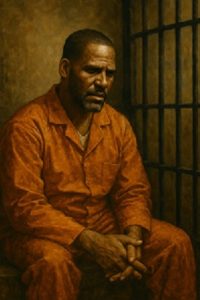For the record:
Once hailed as the undisputed “King of R&B”, Robert Kelly – also known as R. Kelly – now resides not in platinum suites, but behind iron bars. The stage lights have dimmed, the crowds have dispersed, and the only audience he faces now are prison guards and fellow inmates. His voice, once echoing through arenas, now bounces off concrete walls – a haunting reminder of a legacy lost.
Kelly’s descent into incarceration reads like a tragic opera – full of talent, triumph, controversy, and ultimately, justice. His 2022 conviction sent shockwaves across the globe, as fans and critics alike came to terms with the reality that one of music’s biggest stars had used his fame not only to create chart-topping hits, but to cover a dark double life of manipulation, abuse, and exploitation.
In his prison cell, Kelly faces a stark new reality. Gone are the velvet suits and sold-out tours. Now, he wears state-issued uniforms and eats on a rigid schedule. The man who once sang “I Believe I Can Fly” is now grounded by the weight of his own actions. His days are measured not in Billboard rankings, but in cold routines and steel time.
Yet, there remains a strange duality to R. Kelly’s existence. Even in confinement, his music still finds ears – some still separating the art from the artist, others unable to listen without hearing the echoes of his crimes. His voice, once a symbol of soulful passion, now evokes a deeper, darker meaning. Each lyric feels like a hidden confession, every note carrying more weight than ever before

Behind bars, R. Kelly is no longer in control. The star who orchestrated grand performances now lives a life of silent accountability. No handlers. No entourage. Just the echo of choices made and the irreversible damage they caused. Inmates reportedly treat him with a mix of curiosity, caution, and notoriety – a fallen icon among those who’ve seen both justice and hardship firsthand.
The fall of R. Kelly is more than a cautionary tale – it’s a cultural reckoning. It forces us to confront how fame can mask darkness, how power can be abused when left unchecked, and how justice, though delayed, can still arrive. Survivors of his actions are no longer silent; their voices now rise louder than his once did.
While his sentence may span decades, the societal impact of his actions – and his incarceration – will echo even longer. He is no longer just a musician or celebrity. He is a symbol of accountability in an era when silence is no longer acceptable.
Kelly’s story is not just about downfall – it’s about awakening. A reminder that talent does not excuse trauma and that the truth, no matter how long buried, will always find its voice.
 Startrend International Magazine For Your Latest News And Entertainment Gists
Startrend International Magazine For Your Latest News And Entertainment Gists





